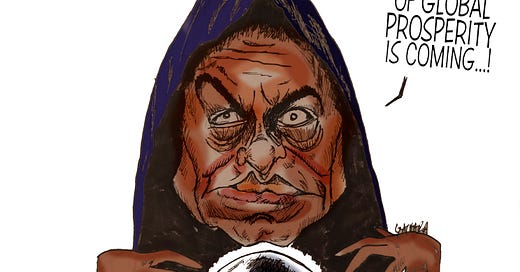Patrick Gathara
Sixteen years ago in the heady days of Barack Obama’s campaign to become the first mixed-race president of the US, prominent American journalist, political commentator, and author, Fareed Zakaria wrote to reassure Americans about a global reconfiguration that was causing them much consternation. Jittery Americans wondered if the US, and by extension Western, pre-eminence would be displaced by other “indispensable” nations. Zakaria assured them that the reconfigurations in the news were less about the decline of the West, and more about the rise of the rest.
It was a shaky opinion to hold even then. The rest may be rising but the West is surely declining.
The West’s demise as an industrial and economic power was already underway in 2008 when Zakaria wrote that essay. The worst financial crisis since the Great Depression was ravaging Western economies. But Zakaria was still insistent that “at the military and political level, we still live in a unipolar world”.
That, of course, was before Brexit, Trump, Covid, Biden’s support of the Gaza genocide or his ignominious retreat from Afghanistan, shattered Western pretensions to global leadership. Today, to claim that the global reconfigurations have little to do with Western decline, would seem like quite a stretch.
Sure, the US is still the premier military power on the planet and has demonstrated that it can hold the UN Security Council hostage on votes over Gaza. But politically, the US has probably never been more isolated and derided than it is today. And it only has itself, not the rest, to blame. Its behaviour domestically and on the global stage has seen its prestige decline.
... while the US is viewed positively around the world, such sentiments have decreased in most countries since the start of the Gaza war.
The US still enjoys a better reputation than rivals such as China and Russia – and has even seen rises in popularity in some countries, including in my own, Kenya, according to a poll by the Pew Research Centre. However, the 2024 Democracy Perception Index – billed as “the world’s largest annual study on how people perceive democracy” – indicates that while the US is viewed positively around the world, such sentiments have decreased in most countries since the start of the Gaza war.
Western hypocrisy in the ongoing genocide makes the supposed primacy of Western values – you know, the lectures on democracy and human rights the rest were forced to endure as the price of aid – seem like a joke.
Even the undisputed military supremacy of the US might not be much of a consolation. After all, even with 50,000 tons of American arms and seeming carte blanche to bomb whatever it wants, Israel has been unable to eliminate Hamas, who, despite the loss of their leaders, including Ismail Haniyeh and Yahya Sinwar, continue to make a stand.
For all their might, there appear to be limits on the West’s ability to cow adversaries like Iran, the Houthis, Hezbollah or Hamas into submission.
But in one way, Zakaria’s sentiments ring true: the rise of the rest will birth a better world. The demise of the Western Roman Empire 1,500 years ago is said to have inaugurated the Dark Ages: an era of economic, intellectual, and cultural decline across Western Europe.
The West clearly is not going the way of Rome any time soon, but a new and more prosperous Dark Age is already emerging with the economic emancipation of billions in China, India and elsewhere literally changing the complexion of global power and influence.
And the future will only get darker as the Western linchpins, the US and the UK, continue to pretend at global influence while actually marginalising themselves, and the rest continue to march forward.





I love this article - and the cartoon. One of the many empty slogans in the UK around Brexit was the emergence of Global Britain. Well, like the rest of the empty promises and claims made at the time, we shall be waiting for a very long time for this! And given the new UK government's 'red lines', they are preventing themselves from making really meaningful improvements to relationships. One exception is perhaps in defence - but that merely serves to reinforce the extent of the UKs decline in capabilities. One question though - is that such a bad thing?!
But there is one aspect of this article that, might I suggest, is present throughout but not stated explicitly? The perception of where 'The West' now stands is only seen in 'The West', reflecting its self-perception still as the main focal point of the world. Being unable to see the rise and improvements of other parts of the world (including, as you so rightly point out, the elevation of billions out of the deepest poverty) in terms other than that it must mean we in The West are declining, seems to point to a bizarre degree of self-absorption. Oh woe is me...